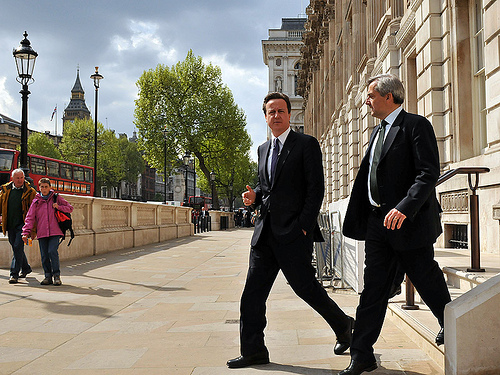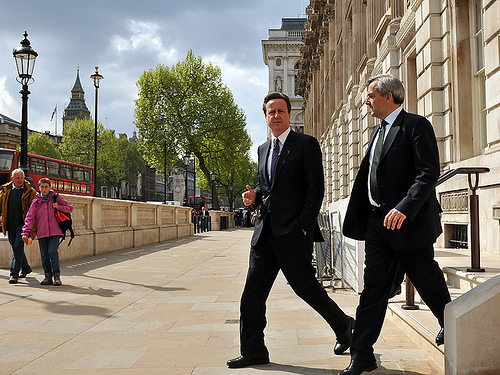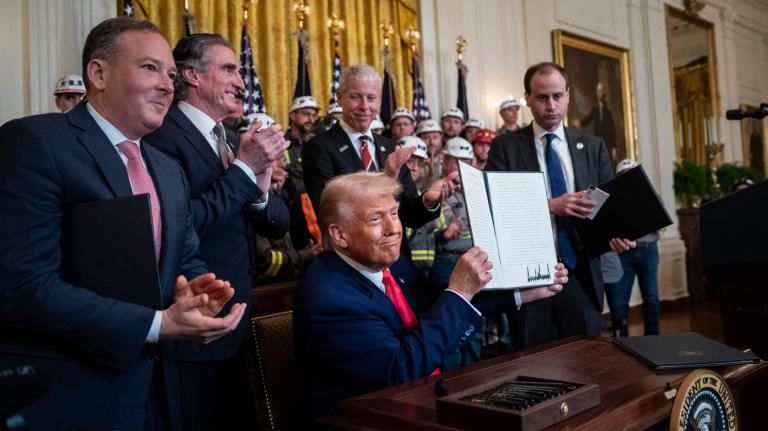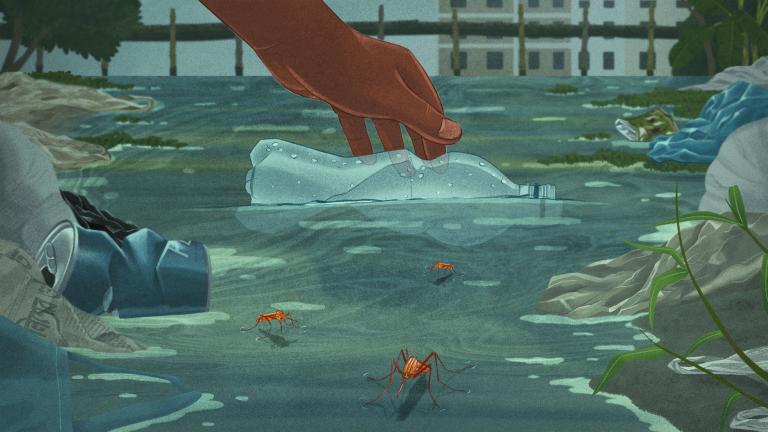 Prime Minister David Cameron and Energy and Climate Change Secretary Chris Huhne heading out to announce that the government will cut its greenhouse-gas emissions by 10 percent over the next 12 months.Photo: Prime Minister’s OfficeEnvironment policy didn’t break the surface during the U.K. election campaign. How will it fare in a coalition of parties at opposite ends of the political spectrum?
Prime Minister David Cameron and Energy and Climate Change Secretary Chris Huhne heading out to announce that the government will cut its greenhouse-gas emissions by 10 percent over the next 12 months.Photo: Prime Minister’s OfficeEnvironment policy didn’t break the surface during the U.K. election campaign. How will it fare in a coalition of parties at opposite ends of the political spectrum?
Amongst the many surprises of the recent British election campaign was the near absence of environment from the parties’ campaigns and the first ever prime-ministerial debates. Does it mean the British care less about the environment than in previous years? Apparently not: The share of the green vote held up and the Green Party won its first-ever seat in the British Parliament (Caroline Lucas, leader of the party and long time member of the European Parliament, taking Brighton from Labor).
But with the parties fairly close to each other on much of environment policy, there were more points to be scored by talking about social policy (we are bracing ourselves for Conservative Prime Minister David Cameron’s “Big Society,” whatever that means) and, of course, dealing with the deficit, where we are up there with European basket cases like Greece, Spain, and Portugal.
Having torn lumps out of each other for months on these and other issues, our identikit party leaders now find themselves round the table in Britain’s first true coalition government in 65 years — with the Conservative Party in charge along with the minority-partner Liberal Democrats. I’ll spare you the constitutional niceties of how that came about; suffice to say that political commentators, having had to speculate wildly for several days about what the outcome of the election might be, now find themselves, along with the new government, in largely uncharted waters. In a cabinet of 23, Lib Dems hold five posts, including the responsibility for energy and climate change, which has gone to Chris Huhne, millionaire businessman and one-time contestant for the leadership of the Lib Dems.
This appointment throws into sharp relief the strategic and tactical questions this coalition raises for the future program of the government, not least on environmental policy. Despite substantial areas of common ground — on the need to cut emissions, boost renewable-energy generation, and create a “green bank” for investment in cleantech, for example — the Lib Dems have long been opposed to new nuclear reactors to replace Britain’s aging nuclear fleet, whilst the Conservatives see nuclear as the mainstay of both emissions reduction and future energy security in the U.K.
This issue is such a clear divide that in the formal agreement about the coalition, the issue is dealt with directly, with a bizarre result. The government (i.e., Huhne) will bring forward a “national planning statement” that will give permission for new nuclear plants to be built, but then Lib Dems (including Huhne) would be allowed to abstain from the vote bringing it into force. This in effect means that the Conservatives can push it through on their own, whilst the Lib Dems have (just about) a path of dignity in opposing it and allowing it. What Green supporters who voted Lib Dem for their anti-nuclear stance will make of this is anyone’s guess.
In any case, both parties are agreed that there should be no public money for nuclear power, and since no nuclear power plant has been built, ever, without such subsidy, it will be interesting to see if any of the utility companies that were lining up to build the new capacity will still find it so appealing. Lib Dems are presumably hoping not.
Elsewhere the picture seems a bit clearer, and generally positive for the environment. Campaigners are elated at the scrapping of Labor’s plans for a third runway at Heathrow. The coalition agreement makes positive noises about a new high-speed rail network — though it’s hard to see how that will be paid for any time soon. Though there’s no new target on the proportion of energy from renewables, investment in marine power and anaerobic digestion gets a mention, as does a smart grid to link it all up, smart meters to make us all more frugal in using it, and other measures to boost energy efficiency in the home. And along with the promise of public investment in carbon capture and storage (CCS) and a floor price for carbon comes an undertaking to prevent new coal-fired power without sufficient CCS to meet a demanding emissions standard.
Some cynics have suggested that Lib Dems have been given jobs that are either so marginal to the conservative project that they don’t matter, or that require them to dip their hands in the blood of “dealing with the deficit” and so alienate their supporter base. A more nuanced view is that the coalition has enabled Cameron to do what he could not have done with a majority, giving him a reason to be more positive about the environment and Europe and move his party further onto the center ground. If he succeeds in finally decontaminating the Tory brand in this way, they argue, he will have laid the foundation for successive conservative governments for many years to come.
Whatever the motivation, the new team have started with a bang. On Friday, Cameron announced that government will cut its own emissions by 10 percent in the next 12 months. Speaking to staff at the Department for Energy and Climate Change, he said, “I want this to be the greenest government ever.” Meanwhile, Huhne took up the reins at DECC, promising to put energy security “at the heart of the U.K.’s national security strategy” and to “fundamentally change how we supply and use energy in Britain.” Amen to that.




